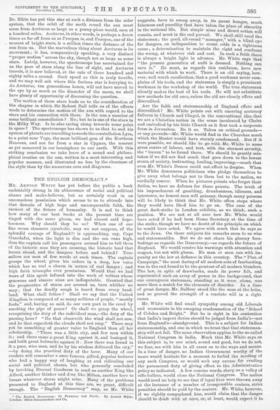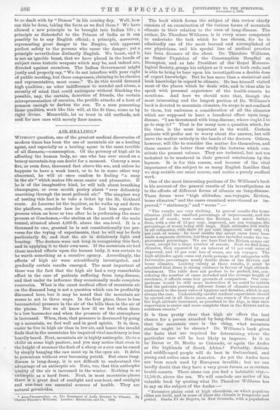THE ENGLISH DEMOCRACY.* Mn. ARNOLD WHITE has put before the
public a book undeniably strong in its abhorrence of social and political shams and make-believes, but as certainly weak in an unconscious pessimism which seems to us to obtrude into that domain of high hope and unconquerable faith, the earnest of the future of humanity. It is sad to think how many of our best books at the present time are tinged with the same gloom, we had almost said hope- iessneas. Why should they be so P When one of our fine ocean steamers (symbolic, may we not suppose, of the splendid courage of England ?) is approaching, say, Cape Guardafui, when the light is dim and the sea runs high, does the captain call his passengers around him to tell them of the historic seas they are crossing, the historic land that looms ahead, and the dangers before and behind? True sailors are men of few words at such times. The captain grasps the wheel, gives his orders ia a deep, low voice which has so real a charm in scenes of real danger ; and high faith triumphs over pessimism. Would that we bad more of this spirit infused into the work of writers whose generous and sincere aims are indisputable. Granted that the prognostics of storm are around us, turn whither we may ; that the deadly sough is heard from every head- land. What shall follow ? Shall we say that the United Kingdom is composed of so many millions of people, "mostly fools," and, haying so said, do our own part in the revel by smoking the pipe of peace? Or shall we grasp the wheel, recognising the duty of the individual man,—the duty of the passing hour "He that observeth the wind shall not sow, and he that regardeth the clouds shall not reap." There may yet be something of greater value to England than all her scholarship. "There was a little city, and few men within it; and there came a great King against it, and besieged it, and built great bulwarks against it ; Now there was found in it a poor, wise man, and he by his wisdom delivered the city," —by doing the practical duty of the hour. Many of our readers will remember a once famous, gifted, popular lecturer who had a happy way of laughing at and ridiculing our social and political shams, but who generally concluded by invoking Eternal Goodness to send us another King like , Alfred, another thinker and doer like Milton, another hero to breast whatever storm might arise. Many of the problems presented to England at this time are, we grant, difficult enough. The "English Democracy" may, as Mr. White * The Enyhah Democracy its Promisee and Perils. By Arnold Wbite. London; Swan Sonnensohein and Co. , suggests, have to sweep away, in its gaunt hunger much falseness and puerility that have taken the place of sincerity in the national life. But simple aims and direct action will remain, and must in the end prevail. We shall still need the statesman; the good, all-round "manager," with a blind eye for dangers, an indisposition to count odds in a righteous cause ; a determination to maintain the right and confront the wrong, at whatever risk and cost. In such a faith there is always a bright light in advance. Mr. White says that "the present generation of unfit is doomed. Nothing can save it." He must, as regards this residuum, have new material with which to work. There is an old saying, how- ever, well worth recollection, that a good workman never com- plains of his tools, and the statesman is simply a prominent workman in the workshop of the world. The true statesman silently makes the best of his tools. He will not substitute new methods for old ones, unless the old are clearly effete and discredited.
Are the faith and statesmanship of England effete and discredited? Mr. White points out with unerring accuracy failures in Church and Chapel, in the conventional idea that we are a Christian nation in the sense inculcated by Christ and embodied by his little Church as it first took a corporate form in Jerusalem. Be it so. Taken on critical grounds— or any grounds—Mr. White would find in the Churches much which the Master would have sternly condemned. But if it were possible, we should like to go with Mr. White to some great centre of labour, and test, with the sternest severity, the " leaven" to be found there. We should be greatly mis- taken if we did not find much that goes down to the lowest strata of society, instructing, healing, improving,—much that even Mr. White's Demos could not affect to despise. When Mr. White denounces politicians who pledge themselves to give away what belongs not to them but to the nation, we cordially concur. When he pictures priests who forget their duties, we have no defence for those priests. The truth of his impeachment of gambling, drunkenness, idleness, and ignorance, no honest man will gainsay, though many persona will be likely to think that Mr. White often stops where they would have liked him to go on. The case of the great dock-strike in London exhibits, as we think, such a position. We are not at all sure how Mr. White would have acted if he had been Home Secretary at the time of the strike, though we have no doubt of the principle on which he would have acted. We agree with much that he says as to the Jews. On these subjects his remarks seem to us wise and statesmanlike. But we do not share his gloomy fore- bodings as regards the Democracy,—as regards the future of England. We would receive his warnings with attention and respect, but not with gloom. No man or men can with im- punity set the law at defiance in this country. The "Plan of Campaign," the most daring of all modern acts of freebooting, was in the end found to be the greatest of all modern blunders. The law, in spite of drawbacks, made its power felt, and represented such an array of power in the background, that one courageous statesman, standing as it were alone, was more than a match for the elements of disorder. In a time of great danger, Mr. Balfour stood like the man at the helm, and so proved the strength of a resolute will in a right cause.
Mr. White will find small sympathy among old Liberals and economists in his sweeping condemnation of the "School of Cobden and Bright." But he is right in his contention that India's import duties should be judged from India's—not from England's—standground. This is a subject for Indian statesmanship, and one in which we trust that that statesman- ship will not fail. The same observation applies to the so-called National Congress in India. Much that Mr. White says on this subject is, to our mind, sound and good, but we do not, we fear, see with him in all cases as to the ways and means.
In a time of danger, no Indian Government worthy of the name would hesitate for a moment to forbid the meeting of any such Congress, or would seek any excuse for evading the paramount duty of giving effect to the Administrative policy so indicated. A few concise words, sharp as a volley of rifle-bullets, would close the National Congress. The nation would need no help to see that if loyal lives were thrown away at the instance of a number of irresponsible orators, strict penalties should be paid by the orators. Mr. White, however, if we rightly comprehend him, would claim that the danger shoald be dealt with at owe, or, at least, woalcl expect it. to be so dealt with by " Demos " in his coming day. Well, how can this be done, taking the facts as we find them ? We have allowed a new principle to be brought into Indian life ; principle as distasteful to the Princes of India as it can possibly be to any English official; a principle, moreover, representing great danger to the Empire, with apparent perfect safety to the persons who cause the danger; yet a principle nevertheless distinctly English. We boast, and it is not an ignoble boast, that we have placed in the hands of subject races historic weapons which may be, and indeed are, directed against ourselves. The Indian Government might justly and properly say, "We do not interfere with your right of public meeting, but these congresses, claiming to be elective and representative, must cease." To do this would demand high qualities ; an utter indifference to scandal and abuse, a serenity of mind that could anticipate without flinching the possible, nay, the certain, desertion of friends, the certain misrepresentation of enemies, the prolific attacks of a host of penmen enough to darken the sun. To a man possessing these qualities, work like this will, at the fit time, come as by right divine. Meanwhile, let us trust to old methods, not seek for new ones with merely finer names.



















































 Previous page
Previous page